Prohibition: India
(→History) |
(→SC ban on NH liquor vends does not apply to bars) |
||
| Line 110: | Line 110: | ||
=Kerala= | =Kerala= | ||
| − | |||
| − | |||
| − | |||
| − | |||
| − | |||
| − | |||
| − | |||
| − | |||
| − | |||
| − | |||
| − | |||
| − | |||
| − | |||
| − | |||
| − | |||
| − | |||
| − | |||
=Mizoram= | =Mizoram= | ||
[[Prohibition: Mizoram]] | [[Prohibition: Mizoram]] | ||
Revision as of 23:50, 24 May 2017
This is a collection of articles archived for the excellence of their content. |
Contents |
History
Liquor prohibition rules
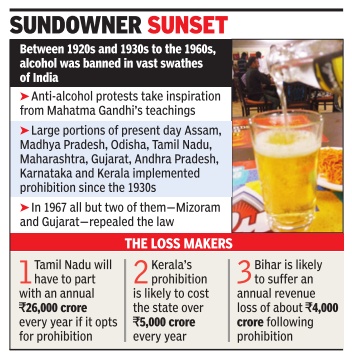
From the archives of India Today , July 27, 2008
Many states tried prohibition but had to backtrack later
• The Bansi Lal government kept its election promise and introduced prohibition in Haryana in 1996. But bordered by three states, implementing the policy became difficult, giving rise to liquor mafias. Besides, the state was losing about Rs 1,100 crore a year. The policy was repealed after only 21 months.
• The N.T.Rama Rao-led TDP government declared Andhra Pradesh dry in 1995 with a clear eye on the women’s vote but prohibition was repealed by his son-in-law N. Chandrababu Naidu who seized power following a family coup in 1997.
• Tamil Nadu, dry until 1971, went wet only to revert to prohibition in 1974.Repealed dry laws in 1981 and wet since.
All-India prohibition
Liquor sold within 500m. of highways
SC reiterates ban on liquor vends within 500m. of highways
SC order applies only to vends, not hotels, bars: Ex-top judges, April 5, 2017: The Times of India
The Supreme Court ban on liquor sale along highways is limited to retail shops and vends, and does not apply to hotels, restaurants and bars, according to two eminent former judges.
In separate and similar opinions to two hotel and restaurant associations, former Supreme Court Justice B N Srikrishna and former Delhi high court Chief Justice A P Shah have interpreted the SC order differently from excise and other authorities.
Srikrishna said the “question before the SC and answered by the SC categorically was that no liquor vends should be permitted within certain distance of highways and finally all liquor licenses for shops and vends, if already issued, shall end by March 31after which there shall be no fresh liquor licenses issued. Shah, who also served as chairman of the Law Commission, “opined“ that the ban “applies only to liquor shops and vends and does not extend to hotels and restaurants within 500 metres from the national and state highways across the country“.
The SC by its orders on December 15, 2016 had directed that it “restrains the grant of licences for the sale of liquor along national and state highways and within 500 metres of the outer edge of a highway or of a service lane along the state highway.“ While the judges' opinions were based on the directions issued by the SC in December, hotel and restaurant owners contend that the March 31order was in line with what the court had earlier laid down. The only modification was that “for areas comprised in local bodies with a population of up to 20,000 people, it reduced the distance from highway to 220 metres. Srikrishna said, “In my opinion, it would be necessary to look at the background in which the judgment by SC was rendered to appreciate its import.“ Both he and Shah observed how two different public interest litigations had sought implementation of a liquor policy of the Centre and of various states to regulate retail liquor outlets or vends along and close to the highways to deal with the rise in road accidents due to drunken driving.The PILs were before the high courts of Madras and Punjab & Haryana in 2012. Shah said, “It is pertinent to note that neither of these two judgements (by the two high courts) dealt with serving of alcohol in hotels or restaurants... A distinction in liquor licenses for various establishments was a prominent reason both legal luminaries cited to state why the SC ban would apply only to liquor vendsshops and not hotels or restaurants. “Licenses issued for sale of liquor and consumption of liquor on premises are distinctly different and operate in favour of different categories of establishment, said Srikrishna. “A liquor vend or shop is not permitted to allow consumption of alcohol on its premises. Conversely , an establishment like a bar, restaurant or a hotel, is permitted to allow consumption but not allowed to sell liquor on its premises, he noted.
Shah too said, “It is important to understand different licences are granted for sale or service of liquor in shops and in hotelsrestaurants. The Punjab & Haryana HC too had taken note of “the menace of drinking and driving arising from liquor vends being easily accessible from highways, he said.
Srikrishna said, “ A reading of the SC judgment (dated December 15) would clearly indicate that all observations made by the SC were against permitting liquor vends shops within certain distance of the highways...The direction also suggests that what is prohibited is visibility of a shop for sale of liquor. Senior advocate Lalit Bhasin also said the order does not apply to hotels, restaurant or bars. “In the main judgement there is not a whisper about any prohibition on service of alcoholic beverages by hotels, restaurants and bars located close to the highways,“ he said. These, he said, were “different and distinct“ from shops and vends, and the two could not be “clubbed together“.
’SC order applies only to vends, not hotels, bars’
Bihar
‘Bihar Excise Act does not ban possession of liquor’
The Times of India, Jun 02 2016
In Bihar, mere possession of booze is no crime, says HC
The Patna high court has ruled that mere possession of liquor is not illegal as the Bihar Excise Act has provisions for penal action only in cases of “trade and consumption of alcohol“ -an interpretation that could lead to release from jail of suspended JD(U) legislator Manorama Devi, who was arrested after six liquor bottles were found in her house last month. The high court, in its order of May 26, had said the Act was silent over possession of liquor. The interim order was passed by a bench led by acting Chief Justice Iqbal Ahmed Ansari while hearing a petition filed by Ram Sumir Sharma, whose house in Aurangabad was sealed after liquor bottles were seized from his nephew last month. Over 3,000 raids have been conducted and over 100 people are behind bars for possessing booze. The court especially pointed out that a minute reading of Sec 19(4) of the Bihar Excise Act makes it clear that the state government has not “prohibited possession of liquor by anyone“, and unless such a notification is issued, possession of Indian-made foreign liquor (IMFL) would not become an offence punishable un der the Act.
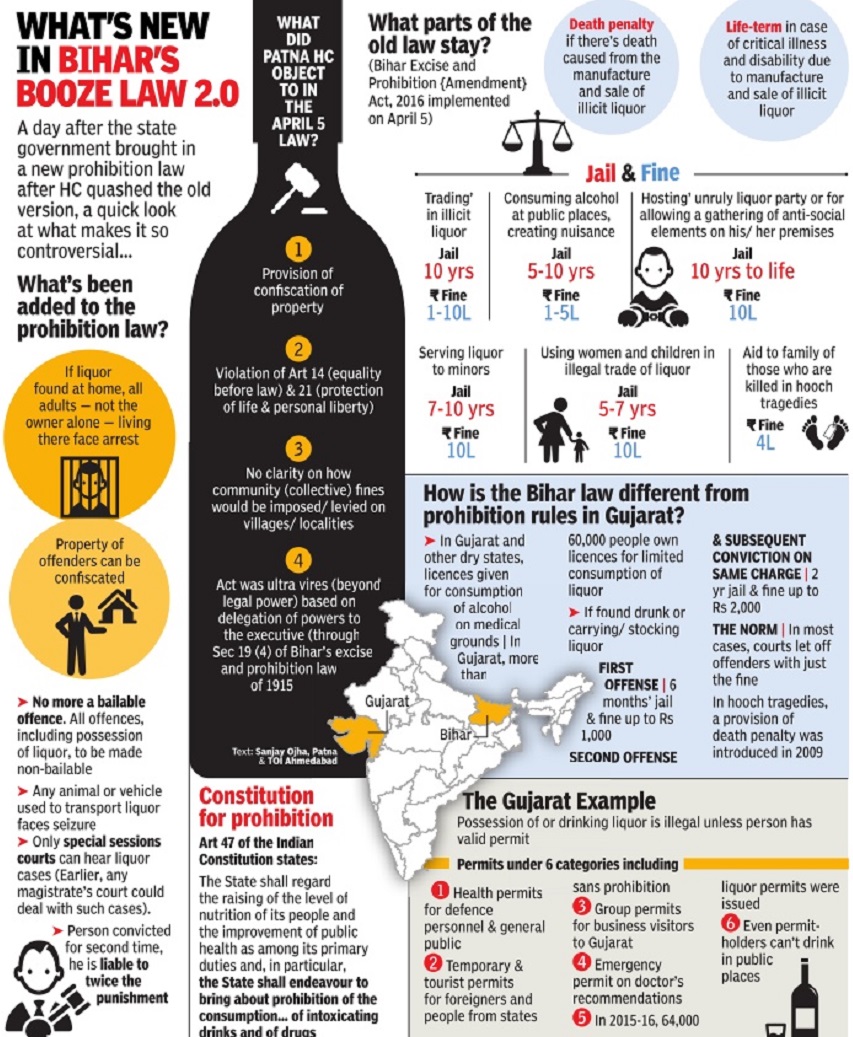
The Times of India
After the HC extended relief to Sharma and directed the government to remove the sealing of his house, suspended MLC Manorama Devi's counsel Y B Giri said he would seek her bail on the same grounds.
“We will inform the court that liquor was there in house before April 5, the day total prohibition was imposed, and there is no guideline in the Act that alcohol in possession should be disposed of,“ Giri said.
Some legal luminaries said the judiciary has pointed out a major lacuna in the prohibition law or at least in its “ill-informed“ implementation. They said the high court has tried to guide the legislature into making an exhaustive law.
While the phone of excise and prohibition minister Abdul Jalil Mastan was switched off, state excise and prohibition commissioner Kunwar Jung Bahadur maintained that possession of liquor is still illegal.
2016 Sept/ HC: Existing Act “draconian;“ State govt. brings new law
Just hours after the Patna high court quashed the Bihar prohibition law on 30 Sept 2016 , causing spirits to rise among tipplers in the state, the Nitish Kumar government announced in the evening it would notify the new Bihar Prohibition and Excise Act, already passed by the state legislature, on Gandhi Jayanti, October 2.
Earlier in the day, the HC allowed an appeal by a host of petitioners against the Act that banned the sale and consumption of India-made foreign liquor (IMFL) in the state.
Referring to the harsh provisions in the existing Act, including confiscation of properties of liquor traders and a community fine on villages where liquor was manufactured, the court described the law as “draconian“ and said it “can't be justified in a civilised society“. The division bench of Chief Justice Iqbal Ahmed Ansari and Justice Navaniti Prasad Singh quoted a Supreme Court ruling in its order. However the state government said the court order would not stop the new law coming into effect from Sunday .“There's no doubt about enforcement of the new law,“ Bihar principal additional advocate general Lalit Kishore said. The HC order, Bihar principal additional advocate general Lalit Kishore explained to the CM and senior state officials, struck down the Bihar Excise (Amendment) Act, which made trade and consumption of IMFL across the state illegal since April 5.“The court order has termed only one Section 19(4) of the previous Act `ultra vires'. It does not say anything about the revised Act passed by both Houses of the state legislature. It is already an Act. It will be notified on October 2,“ Kishore told TOI.
He said the two Acts are different. “Only one section (19-4) of the annulled Act empowered the state government to enforce prohibition. But the new law is entirely about prohibition,“ he said.
[Seven days later The SC stayed the Patna high court order striking down a six-monthold Bihar government notification banning the sale and consumption of liquor in the state.]
2 Oct 15: new Act is stricter still
Bihar chief minister Nitish Kumar enforced the Bihar Prohibition and Excise Act, 2016 in the state on 2 Oct 2016 two days after the Patna high court had struck down the previous prohibition law calling it draconian.
The new Act has harsher provisions like arrest of all adult members of a family if liquor is recovered from a house. Associations who had challenged the previous law are likely to oppose the new Act also in the HC.
However, Kumar kept a window open for amending the new Act. “The winter session of state legislature is approaching. If suggestions are given with positive commitment to prohibition, then they are welcome,“ Kumar said after the special meeting of the cabinet.
Rejecting claims that the new Act is an extension of the previous excise Act introduced on April 5, Kumar said, “The previous Act was an extension of an amendment of the excise Act of 1915 and it paved way for imposition of prohibition through delegating powers to the executive.However, the new Act is a pure prohibition Act in itself.“
Speaking on the provisions which the Patna HC termed draconian in its order, the CM said, “If liquor is found in home, then who should be held responsible? If someone co mes drunk from neighbouring Jharkhand, Uttar Pradesh, West Bengal or Nepal and creates nuisance here, then who should be held responsible?
Those having reservations against such norms should give their suggestions.“ Defending the strict stand of his government on prohibition, Kumar said, “The SC has stated that consumption and trade of liquor is not a fundamental right. Besides, directive principles of state policy also state that it is the responsibility of the government to dissuade consumption of liquor.“
Alcohol in ayurvedic, homeopathic medicines
Patna HC quashes Bihar ban
HC quashes Bihar ban on alcohol use in meds
The Patna HC qu ashed the Bihar government's notification banning use of alcohol for manufacturing ayurvedic and homeopathic medicines in view of prohibition in force in the state. The state government, through a notification dated March 17, 2016 had denied issuing further licences to manufacture ayurvedic and homeopathic medicines having alcohol content.
Gujarat
Daman- Gujarat should merge: HC
Merge Daman with Guj to stem liquor flow: HC, April 12, 2017: The Times of India
The Gujarat high court suggested that the Centre should merge the Union territory of Daman with the state of Gujarat so that prohibition laws can be implemented effectively in the dry state.
Prohibition has not worked well in dry Gujarat, the HC observed. Daman is a big hub outside the state where liquor is available in abundance and large quantities are coming into the state from the Union territory , it said.
“It is high time the central government considered denotifying Daman as a part of the Union territory and made it a part of the state of Gujarat so as to make the Prohibition Act applicable,“ the HC said.
Justice J B Pardiwala rejected quashing petitions by 11 liquor sellers from Daman who were booked under prohibition laws. Liquor purchased from them by bootleggers had been seized in Gujarat.
Kerala
Mizoram
Legality of prohibition
States could ban public consumption of cigarettes, alcohol: SC
The Times of India Jan 01 2016
W hile upholding the Ke rala government's decision to bar all hotels except five-star establishments from serving liquor, the Supreme Court also ruled that states could ban public consumption of cigarettes and alcohol even if they had not taken any step to restrict production of these two intoxicants, reports Dhananjay Mahapatra.
“Consumption of tobacco and liquor is deleterious to health... Banning public consumption of either cannot be constrained,“ said an SC bench of Justices Vikramajit Sen and S K Singh.
Economics
The effect of SC’s order banning liquor outlets on highways
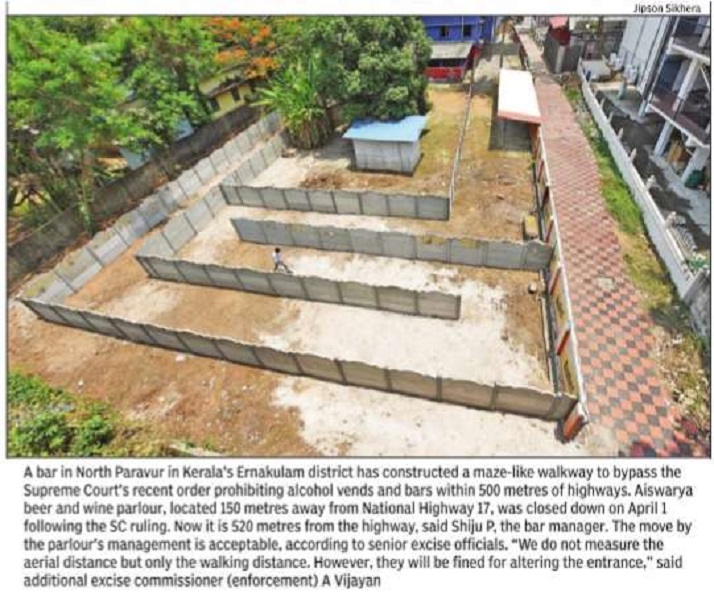
From The Times of India
Boby Kurian, SC order puts 42% liquor biz in limbo, Jan 19, 2017: The Times of India
After raising a toast to road safety in their campaigns for years, global drinks giants Diageo and Pernod Ricard have fallen silent on last month's Supreme Court order banning liquor outlets and bars on national and state highways.The reason: They , along with other Indian distillers, are probably bracing for a significant business disruption with data suggesting that 42% of liquor vends in the country face dislocation when the court directive takes effect on April 1.
In India, 330 million cases (9 litres each) of branded liquor are sold through more than 64,000 licensed outlets. Nearly 26,800 of them need to be relocated or closed down, according to industry data vetted by the country's top distillers.
On December 15, the apex court ruled that shops and bars selling all forms of liquor within a 500-meter radius of highways should cease to exist citing the rising incidence of alcoholfuelled road accidents. The pub lic works department is expected to determine whether the vends would attract the court gag and must relocate, a complex process which requires the nod of excise departments and local civic bodies.
“While we fully respect the court order, the fact is that most Indian urban agglomerations are centred around highways, making it disruptive for the alcoholic beverages industry .This dislocation of retail trade comes at a very inopportune moment. I have never seen a period worst than the current financial year in my 38-year-old career,“ said Deepak Roy , vice chairman of Allied Blenders & Distillers (ABD), the third largest distiller in the country.
The domestic liquor consumption has swung negative, with 1% degrowth and volume sales declining for major companies like Diageocontrolled United Spirits and ABD. Pernod Ricard is reporting 2% growth, but is staring at its lowest India growth. Predictably , United Spirits and Pernod Ricard declined to comment on the story.
Several retail associations are moving a review petition in the top court, the fate of which would be known in the coming days. These petitioners are likely to plead that less than 6% of road accidents in the country are alcohol-induced ones. Roy said the impending dislocation has the potential to push a large part of the trade underground, or causing them to dry up. “The fact that we are perceived as a sin industry and a heavily regulated one reduces the manoeuvring space,“ he added.
The impact on liquor trade will be the most in hilly regions like Meghalaya, Jharkhand and Uttarakhand and densely populated markets -which would include the high-profile business corridors in Gurgaon and even the Western Express highway in Mumbai. Most big states such as Maharashtra, Telangana, Andhra, Rajasthan and West Bengal will see between 40% and 60% of the retail trade facing the axe. Telangana is considering a move to denotify state highways in urban centres as excise revenue from the liquor trade fills the coffers of several federal governments.
Bihar, 2016: roads much safer, deaths down 60%
Crashes Also Come Down By 60%
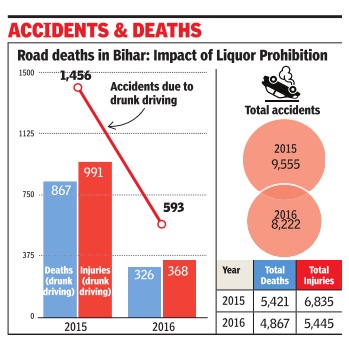
Complete prohibition of liquor in Bihar has resulted in over 60% reduction in road deaths and crashes caused due to drunk driving. Unpublished data accessed by TOI show that while 867 persons died in 2015 due to drunk driving in the state, fatalities reduced to 326 during 2016.
The declining trend in road accidents come at a time when the country is debating whether limiting access to liquor for drivers on highways actually brings down road crashes, fatalities and injuries in the light of Supreme Court banning sale of liquor within 500 metres of either side of National Highways.
Sources in Bihar police said liquor prohibition has actually helped in reducing road deaths in the state and Bihar has recorded maximum improvement among states during 2016 so far as road crashes and deaths are concerned.
Bihar registered 541 fewer deaths in road crashes in 2016 in comparison to the previous year. Data show that this reduction happened primarily due to sharp fall in fa talities due to drunk driving.
According to World Health Organisation reports, drinking and driving is one of the main causes of road crashes worldwide. In high-income countries about 20% of fatally injured drivers have excess alcohol in their blood, while in some low and middleincome countries these figu res may be up to 69%.
However, due to poor enforcement and detection primarily because of lack of trained personnel and gadgets India officially registers very few drunk driving cases. According to published data of 2015, intake of alcohol drugs accounted for only 16,298 crashes and claimed 6,755 lives despite alcohol consumption and drunk driving being very common on Indian roads.This is the reason why data recorded by police are often questioned by experts.
“Fall in road deaths in Bihar needs to be applauded. However, since crashes are not scientifically investigated, the data on causative factor is unreliable. We have to have proper investigation of crashes to find reasons for taking corrective measures,“ road safety expert Rohit Baluja said.
Recognising, drunk driving as a major risk for road safety , the amendments to the Motor Vehicle law have proposed fine up to Rs 10,000 for drunk drivers for first offence and up to Rs 15,000 for repeat offence.
Impact
Benefits of prohibition: Bihar, 2016-17
Bihar booze ban: A yr on, people save Rs 5k cr, February 12, 2017: The Times of India
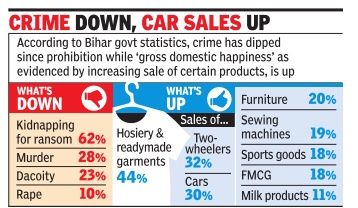
If the Nitish Kumar government is to be believed, prohibition has turned Bihar into the land of lawabiding people and industrious milk drinkers. Its Gross Domestic Happiness' has increased, which will ranslate into enhanced human resource potential, the state government has informed the Supreme Court. Since prohibition was imposed a year ago, abductions dipped by 61.76%, murder by 28%, dacoity by 23% and rape by 10%, while car and tractor sales jumped by 30%.
Sale of milk and milk products has registered an 11% upswing. The other items selling briskly are hosiery and readymade garments (up by 44%), furniture (20%), sewing machines (19%), sports goods (18%), fast moving consumer goods (18%), cars (30%), tractors (29%), twowheelers (31.6%) and engine and motors (33.6%).
The JD(U)-RLD government, in its affidavit to the court, said, “According to annual health survey of 2011, about 9.5% of people of Bihar, including women, in the age bracket of 15 years and above used to consume alcohol. Based on this estimate and taking into account the 2011 Census figures, at least 44 lakh people in the state were alcoholics prior to April 2016, when prohibition was enforced in the state.“ The affidavit said this population of alcoholics was each spending Rs 1,000 on liquor every month on an average, which added up to Rs 440 crore. Thus, nearly Rs 5,280 crore is now being saved a year. “The money which was otherwise spent in consumption of alcohol is now being utilised for augmenting family budget for food, clothing, education and other productive purposes,“ it said through advocate Keshav Mohan.
But the state exchequer took a big hit. The state said it could suffer a excise duty loss of around Rs 5,000 crore because of prohibition. “In order to overcome such revenue loss, the state government has enhanced value added tax (VAT) on certain itemscommodities, which would mitigate some loss to the state exchequer.As a result of prohibition, there is an increase in household savings which is translating into increased spending on consumer items. This, in turn, would increase tax collection of the state,“ the government said.
Apart from drawing an inseparable link between liquor and crime, the state said prohibition enforced since April, 2016 has reduced even riots by 17.52% compared to the same period in the previous year. Road accidents and casualties in such accidents reduced by 20%.
Having to deal with a large number of alcohol addicts, the state government set up de-addiction centres in 38 districts where free counselling was provided. “Since April 1, 2016, a total 8,763 persons have been treated at de-addiction centres,“ it said. This means, on an average each de-addition centre treated 8 persons a month.
See also
Alcohol and the Indian physique
Prohibition: India